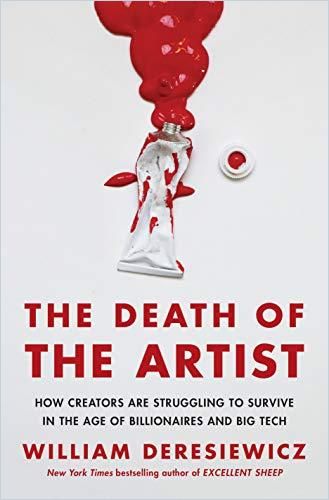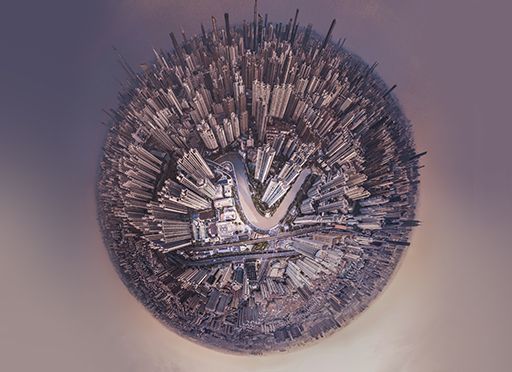Essayist and critic William Deresiewicz offers a depressingly realistic assessment of the agonies of earning a living as an artist.

Art Doesn’t Pay
Award-winning essayist, critic and bestseller William Deresiewicz warns that big tech only wants to pirate art, so that it can make more money. As a result, artists can’t make a living. The author sees today’s artist as a paid producer. But, he insists, artists must regard themselves as workers and organize to undermine big tech’s cultural monopoly.
Deresiewicz’s analysis pre-dates the pandemic, which further decimated the arts economy, but his overview remains relevant for artists, nonprofit leaders and everyone who cares about art. His promise: Pay artists to make art they love, and they’ll make art you love.
Deresiewicz’s book drew admiring reviews from a fascinating mix of readers – art critics, authors, musicians, choreographers – those who learned the hard way about making a living as an artist.
Art Is Work
Artists should get paid. They invest in their own work, and with the money they earn from the “culture industry” – publishers, record companies, art galleries and television – they finance their lives and their next projects.
If art is work, then artists are workers. No one likes to hear this.William Deresiewicz
Almost no artists are middle-class. They’re either poor or wildly successful. Funding for the arts in the United States across all levels of government totals only $1.38 billion – 0.0066 of the GDP. Artists must be entrepreneurs. If they don’t work, they don’t earn.
Where Artists Live
The cost of living has been rising everywhere, but nowhere as quickly as in the cultural hubs of Los Angeles and New York. Rent is a major problem, since artists need living and studio space. The expectation is that artists must dwell near their patrons, publishers and galleries. But galleries and publishers are also suffering as increasing amounts of international money “parks” in big population centers, driving up rents for residents. One result is that more than 20% of music venues in New York have closed since the early 2000s. In San Francisco, a 2015 survey found that 70% of artists had experienced being evicted from their homes or studios.
The solution for artists is to leave urban centers and start new communities in less-frequented locations with affordable rents. Artists have found Pittsburgh, Cleveland, Denver, Austin, Oakland, Cedar Rapids, Iowa and Anchorage, Alaska appealing.
These places will not stay affordable for long. Hipsters and yuppies prefer the authenticity of artist enclaves. When they discover these little Bohemias, the places lose their Bohemian status. Cool cafés and nightclubs appear, displacing artists, as developers convert creative industrial workspaces into residential lofts. To make matters worse, poor but educated white artists then “colonize” neighborhoods that belong to people of color. This pattern repeats and repeats in affordable cities all over America.
The Web
The internet’s devastating economic impact is destroying the music industry. With streaming services owned by the “Big Three” – Spotify, Apple Music and Pandora – artists get paid only a few cents per stream. The most lucrative contracts are for “synchs” – licensing music to video games, commercials and movies.
Amazon decimated publishing by underpricing on a mass scale. Publishers have fewer resources to cultivate new writers, especially literary ones. Writers must write for corporations or freelance.
The industrial economy laid claim to our bodies. The knowledge economy laid claim to our minds. Now the creative economy is laying claim to our souls. William Deresiewicz
The exception is television. TV’s demand for content seems endless. Between Netflix and Amazon, viewers will spend almost $25 billion on content by 2022. Writers have to write spec scripts and network constantly, but with new technology, anyone can put a pilot or web series online. Netflix and Amazon are devouring the market, which, in the future, may mean far fewer edgy, niche projects.
Fallacy
The number of college degrees earned in the visual and performing arts increased by an incredible 97% from 1991 to 2006. What was once a knowledge economy is now a “creative” economy. Art school graduates bring creative skills to every field, because creativity is the new “yeast that makes the dough rise.”
One of the presiding commonplaces of our age, to deny which is to commit a kind of thought crime, is that everyone’s an artist.William Deresiewicz
Masters of Fine Arts (MFA) degrees confer legitimacy on artists, giving them a network and providing teaching jobs, though many of those jobs are precarious and pay poorly. Teachers show themselves to be increasingly unqualified to help art students learn to make money. Students need other skills, such as critical thinking, speaking and writing, especially grant writing.
Piracy
Pirating is rife, and it is lucrative for pirate websites, payment processors, ad sellers and Google. Too many people think they deserve free material, a bias that big tech encourages. Piracy is theft. Art is not a gift, and information “doesn’t want to be free.”
If your business model depends on not paying people, it isn’t a business model; it’s a criminal conspiracy.William Deresiewicz
Creating the illusion that everything on the internet should be free profoundly damages the arts and artists’ careers.
Organize
Deresiewicz states the obvious when he says organizing artists isn’t easy because they value individual autonomy. Artists seldom support one another, even if they personally benefit.
Musicians work for love, writers will write for free, amateurs make better art: All of this is baby talk, make-believe. William Deresiewicz
To help artists, law enforcement must hold big tech accountable. Governments must rein in Apple, Google, Amazon and Facebook. It should also roll back destructive policies, tax the wealth, reinvest in the arts and raise the minimum wage. If you pay artists for their work, they will make more art.
Straightforward message
Deresiewicz’s bleak assessment of the art world’s prospects for creative careerists is as depressingly accurate as his proffered solutions are pie in the sky; governments aren’t going to tax the rich, raise the minimum wage or increase arts funding. Artists are, as ever, on their own. To the author’s credit, he attempts no cheerleading and, to say the least, he’s no Pollyanna.
His message is straightforward: Artists must learn to negotiate the contemporary economic landscape because the world will not offer them a helping hand. Deresiewicz’s opus would be considerably more depressing if he wasn’t such an able, witty, far-seeing writer with a such clear, powerful sense of compassion for artists and outrage at their dilemma.
William Deresiewicz also wrote the bestsellers Excellent Sheep and A Jane Austen Education. Other readings regarding artists in America include How To Be an Artist by Jerry Saltz, Art/Work by Heather Darcy Bhandari, and You Are an Artist by Sarah Urist Green.





